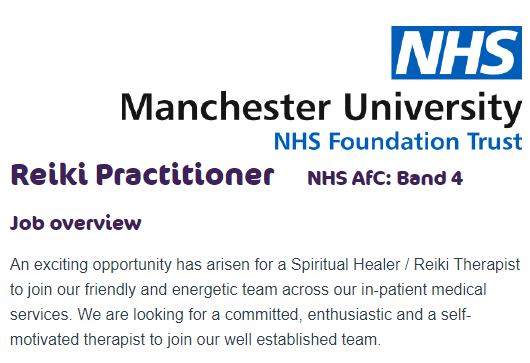Here in the UK, we are immensely lucky to have a healthcare service that’s free at the point of use, and we should never lose sight of that. However, that’s not to say that the NHS is perfect, nor that it is without its issues. One of those issues surfaced and circulated on social media just last week, in fact, the shape of a now-deleted job advert from Manchester University NHS Foundation Trust, advertising a Band 4 position for… a Reiki practitioner.

An exciting opportunity has arisen for a Spiritual Healer / Reiki Therapist to join our friendly and energetic team across our in-patient medical services. We are looking for a committed, enthusiastic and a self-motivated therapist to join our well established team.
Under the headline “Main duties of the job”, they explain what they’re looking for:
The responsibilities of a Reiki healer include treating clients using energy principles, preparing clients’ medical histories, and activating the healing process. To be successful as a Reiki healer, a person requires a calm demeanor, good team working skills, and excellent customer service skills.
Being successful as a Reiki healer doesn’t apparently involve being able to heal people via Reiki. It’s also hard to articulate how disappointing it is to see the NHS even notionally endorsing ideas of “energy principles” and “activating the healing process”.
It goes on to say that the role is:
To deliver Reiki / Energy Healing, under guidance and supervision in the clinical setting of cancer and Supportive & Palliative Care services at Manchester Royal Infirmary (MRI). This involves delivering high quality, personalised holistic treatment programmes in accordance with the policies and procedures of Cancer and Supportive & Palliative care services at MRI. To promote and support patient’s rights by promoting individual choice, respecting beliefs and ensuring privacy and dignity at all times. Providing a high standard of Complementary Therapy service to inpatients and specialist outpatient clinics within In-patient Medical Services.
We’ve heard this tune before, the justification of pseudoscience behind the “patients rights and individual choice” idea… which, of course, is only a valid justification if the things you’re given them a choice between are equally likely to be effective. A choice between magic and medicine isn’t a real choice, especially when you don’t tell the patient which is which.
There’s also a person specification, which explains what qualifications are required. A successful applicant needs to have a Spiritual Healing Qualification (taught to NOS standards) or Reiki 2 System qualification (taught to NOS standards).
Interestingly, the successful applicant also needs to be able to take patient histories and update patient records, and it’s marked as desirable that they’d previously have worked as a nurse. The job ad explains:
We are pleased to be working with The Sam Buxton Sunflower Healing Trust to offer this exciting opportunity across our in-patient medical services at Manchester Royal Infirmary.
It was no surprise to me that the role was in partnership with a charity – in fact, on Sunday afternoon when I got a call from the Telegraph to talk about this story, I speculated to the journalist that I’d be surprised if this was actually an official NHS role paid for by taxpayer money, rather than a position funded by a Reiki charity. The subsequent article led to me receiving the following email:
I’ve being using Reiki for 15 years. Marshall is a pleb who appears not yet to be in his 20s stfu you pathetic plebs.
Lovely stuff, love and light to you to, emailer. On the plus side, they think I’m a pleb who looks barely 20, which I’ll take given I turned 39 on Saturday.
As it happens, my hunch was right, and the position is funded entirely by The Sam Buxton Sunflower Healing Trust, to the tune of £26,282 a year. The Sam Buxton Sunflower Healing Trust is a registered charity which trains “healers” who offer “complementary medicines”. It was founded by Angie Buxton-King in 2006 following the death of her son, Sam, from leukaemia in 1998 at the age of ten. Since 2006, Angie claims to have placed around 40 Reiki practitioners into 18 different trusts – including University College Hospital, London, Wigan NHS Trust, and St Johns Hospice, Lancaster. In fact, the Manchester University ad even specifies that the role will only go to someone trained by Ms Buxton-King:
If you are qualified and experienced as a Spiritual Healer /Reiki Therapist who has completed the Healing In Hospital course, delivered by Angie Buxton-King and would like this opportunity to join this forward thinking team then please contact Susan Heatley and Philip Bryce for an informal visit.
Ms Buxton-King offers her courses regularly, charging £180 under the heading “Do you want to work as a paid healer in a hospital or hospice?”. As she told the Telegraph, it’s only the initial cost for the first two years that gets paid for by the charity:
The NHS need to be shown that this therapy is of use so we fund it for two years, sometimes longer, and then we encourage them to look within their own charitable coffers. So it never comes out of the budget, it’s always out of their charitable funds.
In other words, ‘we’ll get you started on Reiki, we’ll get you used to having a Reiki practitioner in house, as part of the team, and then after two years you have to choose to either let your colleague go, or find some other money to cover their costs’.
To be clear, I’m not suggesting for a moment that there’s anything cynical to this – I’m sure Ms Buxton-King and the various people she trains really do feel that Reiki is effective, and that they almost certainly do feel they’re doing a service to the NHS and to the sick people of the UK by offering Reiki in a clinical setting. I even saw that Ms Buxton-King offers the use of her holiday cottage in Cornwall free of charge to any cancer patient. I have no doubts that she is a good person. But it is also true that someone can have all the good intentions in the world, but if what they’re doing is pseudoscientific and ineffective, the best of intentions can still lead to people being harmed.
I also don’t think the NHS are outrageously out of order here, per se: they’ve been given free money in order to have in their clinic a Reiki practitioner, who they might well figure could offer some degree of comfort to some people… and if it turns out to be of no active help, it isn’t even hands-on, so it presumably can’t harm. Equally, given the pressures on the NHS right now, they may well feel that it’s an extra, free pair of hands who are specifically trained to take patient histories, and update patient medical records, and who might even have some healthcare training to pitch in on little tasks when they’re not waving their hands magically.
However, I do still think that the fact that the NHS are not the ones paying for this service does not absolve the NHS of the responsibility for it, or for the message that endorsing Reiki sends. Reiki is based on the idea that there are energy fields that emanate from the human body and that can be manipulated by trained healers in order to relive ill health. This is simply not true, regardless of how much people would like it to be. In fact, Reiki is quite easy to study and disprove with an experiment so simple a nine year old could do it. A specific nine year old, called Emily Rosa, who is the youngest person to be published in peer-reviewed literature for her 4th Grade science project, debunking therapeutic touch.

Emily found 15 people who claimed they could do Reiki or Therapeutic Touch, and one by one she had them stand on the other side of a screen and put their hands through a gap, so she could see their hands but they couldn’t see her. Then she’d hold her hands over one of their hands, and ask them which one it was. If they could feel an energy field, as they claimed to be able to, they should have been able to tell. None of the practitioners could tell more often than 50-50.
I also don’t think this is as harm-free as it might seem from the outside. It is true that Reiki doesn’t actually do anything, so it is therefore unlikely to do anything bad. And it is also true that in an NHS setting, it’s highly improbable – though not impossible – that the Reiki practitioner would be able to claim to actually do anything tangible, and directly mislead patients. But it is still possible that while talking to a cancer patient about their symptoms, the practitioner might happen to mention – either to the patient, or to their friend or family member – some of the other illnesses they sincerely but wrongly feel Reiki can help with. And those people will be more inclined to believe it, because this conversation is taking place in an NHS clinic.
The job ad itself, even, presents an issue, with the big NHS sign all over it (it was even listed on NHSJobs.com). The halo effect of the national health service’s reputation can’t be understated. There is a reason that alternative health practitioners want to associate themselves with the NHS, and only some of that reason is a sincere wish to help patients. Some degree of it is absolutely that it looks good to have the legitimacy of the NHS behind your therapy. To be able to say to private patients that it must work, else the NHS wouldn’t provide it. Except, they don’t provide it: a Reiki charity does, and the NHS is just the venue. Those subtleties are easily lost, especially when even utterly sincere and well-meaning people have a motive to lose them.
There’s also an opportunity cost in here, too, that we shouldn’t overlook. Because maybe people who are in the middle of a health crisis or a scary diagnosis or a deeply uncomfortable treatment will take some comfort from seeing a Reiki practitioner – they won’t be healed, they won’t even be helped to heal, but they might feel supported, comforted, and they might benefit from the time and attention and interpersonal interaction. All of that is important, but none of that has to come from someone who also believes in magical energy field as a key component to ill-health. Indeed, whose only training is in manipulating non-existent energy fields. Those practitioners therefore are not professionally trained in understanding how to talk to people in ill health, putting people at ease, comforting people without giving them false hope, and showing emotional intelligence to people in crisis.
Most significantly, if people are getting a small amount of those comforts from someone hired as a Reiki practitioner who happens to be able to offer some emotional and moral support, there is a risk that that will be seen as good enough – especially when it’s provided without cost to the NHS. But the upshot of that is that patients are reduced to having to make do with an energy healer when what they could do with might be a talking therapist or a counsellor or someone trained and skilled specifically in meeting people’s emotional needs during their ill health.
And when the two year funding period is up, NHS Trusts will be faced with the prospect of spending their limited charitable money maintaining a service where users get amateur counselling from a practitioner trained in a non-existent field, rather than spending that money to employ someone with the training and expertise to offer patients the level of care they deserve.



